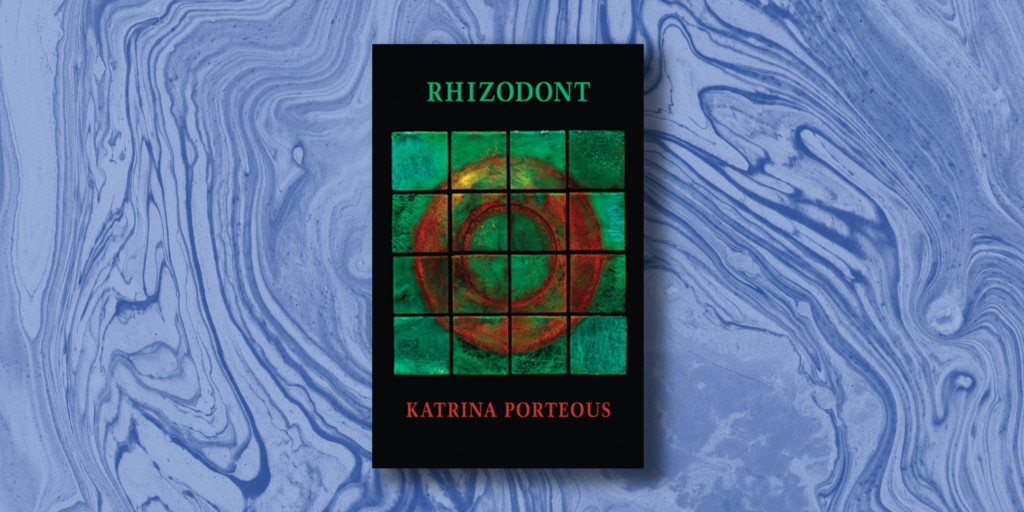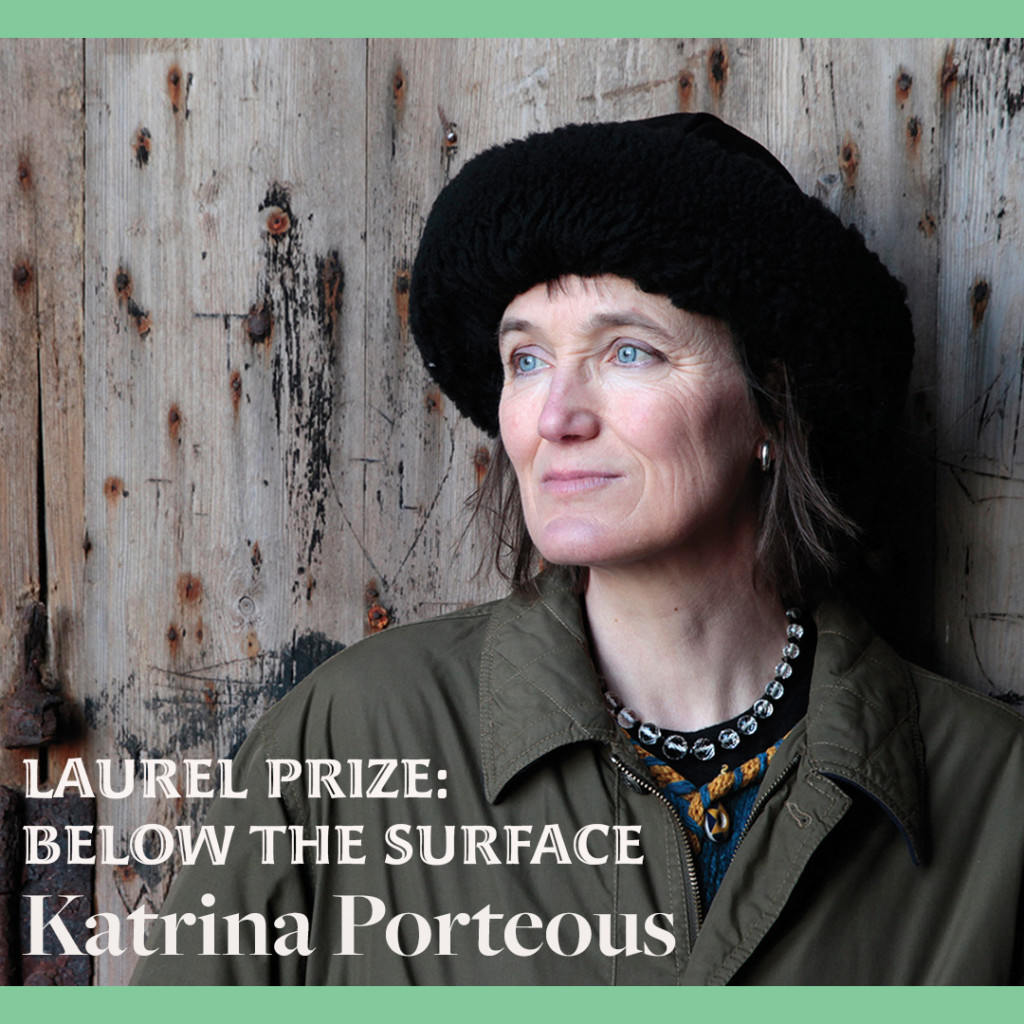Welcome to our Below the Surface series for the 2025 Laurel Prize finalists. These pieces shine a light on the creative practice behind these outstanding collections and show how nature and the climate crisis impacted the authors’ processes. Here’s Katrina Porteous on her collection Rhizodont.

Networks of Nature
Communities and Commissions
I did not set out to write a collection about ‘the environment’. Rather, the poems in Rhizodont reflect my thinking over many years about the coastal landscape and communities in the area where I live, and more recently about science. So I feel that these poems are in conversation with my earlier work and bring together some of its threads.
They are also informed by the voices of the many people with whom I have worked. I wrote them over a period of seven or eight years, mostly as part of small commissions and community projects. I like to be involved in these as they give me a reason to write and a sense of who my first readers will be. Sometimes such commissions are advertised and involve an application process; sometimes I go to a community group with a suggestion which they agree to support. Voices from that community almost always find their way into the poems, as quotations, dialect or speech rhythms. The long poem at the centre of the book, ‘A Lang Way Hyem’, was a radio commission. I apply for these in the same way all radio writers do, by approaching a producer with an idea for the BBC commissioning round.
A Moment of Transition
The ‘Rhizodont’ of the title poem was a huge, predatory fish which lived around 330 million years ago. Its fossil has been found in rocks near where I live. The Rhizodont belonged to a family of fish which were the first creatures to make the transition from water to land, and all four-limbed vertebrates, including humans, are descended from its wider family. I was walking on the shore as part of a community project to ‘engage’ people with the landscape when I learnt about the Rhizodont. As I started to write about it, it became a metaphor for a moment of profound transition – a moment in which I feel our species is now immersed. I gave it a hashtag before its name in the poem’s title in recognition of our transition from an analogue to a digital world.
A Sense of Scale
I did not, however, start with that idea. I started with the landscape. When I need inspiration I don’t turn first to other poets; I go outside and walk, listen and observe. I take notes, and put poems together from hastily scribbled phrases and observations, trying to find connections between disparate things, a thread of sound or visual image to follow. I also read widely around a subject, taking more notes. In the case of the seashore where the Rhizodont’s fossil was found, it was the sheer age of the Carboniferous rocks which impressed me. Coal is a fossil which comes from the same rocks. Our own species has only been around for, at most, a million years. That gives us a sense of scale. Scale and perspective are very important to my poems. It is wondrous to me that these big ideas can live in such a small thing as a pebble.
‘Translating’ Science
The second part of Rhizodont is made up of two sequences of poems, which explore subjects I had to learn about: first, robotics and A.I. and, secondly, technologies used to understand climate in Antarctica. I have no background in science, and learn as I write. In each case, a university science department wanted to ‘engage’ a wider public in their research, and I offered my services. That gave me access to experts, scientists whose research I tried to ‘translate’ into poetry. For ‘Under the Ice’ I learnt about our planet’s great cycles of glaciation, interspersed with much warmer periods. I learnt that 90 million years ago, Antarctica was forested, and completely without ice. And I learnt that ice cores sampled from Antarctic glaciers show that atmospheric Carbon Dioxide levels are nearly 50% higher than before we started extracting and burning fossil fuels in the Industrial Revolution.
Multiple Perspectives
Both ‘Ice’ and ‘Ingenious’ began as audio performances to disseminate scientists’ research to a wider public. I love cross-disciplinary collaborations, because they push my writing into areas which I could not explore on my own. In my earlier collection Edge (Bloodaxe 2019), poems written for a planetarium, I investigated an immense range of scale, from electrons and photons to bodies in outer space. I wanted to find a poetic perspective beyond the subjective, anthropomorphic voice. In Rhizodont I return to a more human landscape, while retaining multiple perspectives, in particular a deeper sense of time – simultaneously viewing the Earth in close focus, and from afar, as ‘a planet in space’.
Fields and Feedback Loops
When you begin a poem, or begin to assemble a collection, the process is similar: you don’t know where it is going to take you. Each is an exercise in generative thinking. Unlike expository prose, poetry seems to me to operate in networked ‘fields’ of sound, image, structure, idea – each of which suggests others. So a poem, like Nature itself, holds within it a simultaneity. When I write, I listen for the resonances between all these elements, and am guided by them, while at the same time trying to remain true to some external reality which others will recognise.
For these reasons, I think that poetry might be uniquely placed to help us think about the natural world. First, poetry roots us firmly in the rhythms and sense experience of our physical bodies and in the living language of our communities, so is an important corrective to our increasingly digital lives. Secondly, the absence of linear narrative-driven control in poetic thinking – the surrender to that deep interplay of networked sound, pattern, subconscious suggestion and feedback – allows us to break through old thought structures and to think in new ways. I find that idea exciting.
Scientific rationalism and empiricism are vital, enabling us to do astonishing things. At the same time, every invention and hypothesis begins from the imagination – What If? I believe that we need both kinds of thought and language – a multidisciplinary, collaborative approach, in which we understand ourselves and our machines as complex systems within the greater complex systems of Nature. Poetic thought networks could have an important role to play in that collaboration.

Katrina Porteous lives on the Northumberland coast and writes from a deep love of its human and non-human lives. She has worked on many collaborations with scientists and musicians, and has published four collections with Bloodaxe. Rhizodont (2024) was also shortlisted for the T.S. Eliot Prize.
Add your Reply
You must be logged in to post a comment.